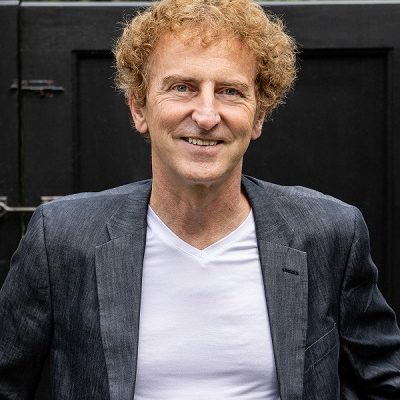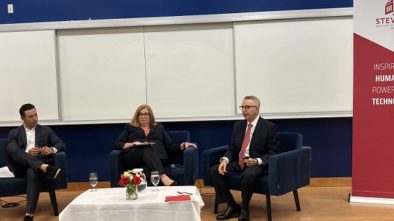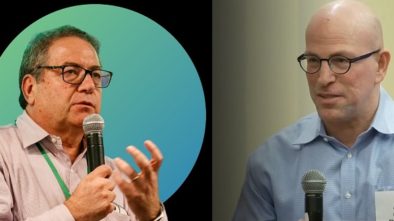Inside Hax’s Move to Newark
In September of 2021, more than a year ago, HAX, part of Princeton-based global venture capital firm SOSV, announced that it would build a state-of-the-art facility in Newark.
The new space’s purpose is to “double down on HAX’s work with founders in industrial, healthcare and climate technology,” according to a recent announcement.
HAX is a tech startup development program focused on companies that are building so-called “hard tech” solutions that require major efforts in science and engineering, as well as shop and lab equipment to take their solutions to the point of commercialization.
SOSV’s partner in the five-year, $50 million Newark project is the New Jersey Economic Development Authority (NJEDA), which, like SOSV and HAX, is committed to the rapid reindustrialization and decarbonization of the United States.
In fall of 2022, HAX announced that it had signed a 10-year lease on a 35,000-square-foot facility at 707 Broad Street, in Newark.
NJTechWeekly.com spoke with both Sean O’Sullivan, founder and managing general partner of SOSV, and Kathleen Coviello, chief economic transformation officer of the NJEDA, to understand how SOSV and the NJEDA worked together to find the right space in Newark to accommodate the HAX program.
According to Coviello, it was July 2020 when Governor Phil Murphy’s office, the NJEDA and the nonprofit organization Choose New Jersey (Newark) began working together to respond to an SOSV request for proposal to put “their world class HAX accelerator that focuses on hardware and decarbonization, in the U.S.”
She added that the proposal was right up NJEDA’s alley and touched on many of Governor Murphy’s strategic areas of economic-planning interest. “SOSV provided an outline of what they wanted, which included access to suppliers and vendors, access to folks in the manufacturing supply chain, and talent and universities that were able to support the deep domain expertise needed for engineers who would work at the HAX companies, and a community that was interested in welcoming these new innovating up-and-coming companies,” Coviello said. New Jersey had all of these assets, and more, she added.
Focus on Newark
The HAX team focused on Newark, a city that is strategically located near top universities and research labs, and only a 25-minute commute from New York, a city with a high concentration of capital and startup opportunities.
According to O’Sullivan, once Newark was chosen, finding the right building was easy because the NJEDA and Choose New Jersey had prepared a document showcasing various locations that they thought would be particularly attractive to SOSV and HAX. Coviello pointed out that the sites had to be ready to go, as SOSV wanted to move quickly into whatever location they chose. Added O’Sullivan, “We looked at all those locations, and they were in many cases spot on.
“And, in fact, the location that we ended up choosing was one of the ones that they had recommended, but we had to go through a bit of a process to get there,” he said. “In the end, we looked at several sites, including some that were not in the showcase document but were in the same sort of neighborhood, and had the same kind of streetscape as is in the Military Park area.” SOSV also looked at several buildings that were close to Newark Penn Station, he noted.
“In fact, there were about seven buildings that were seriously considered, and the company chose its current location because of both the neighborhood and the willingness of the property owner to be very flexible with their accommodations and what they could provide,” O’Sullivan told us.
O’Sullivan noted that while Newark’s high-speed internet availability is exceptionally good and the building is close to public transportation (within walking distance to Penn and Broad Street stations), there were concerns specific to HAX that the team had to consider.
He explained SOSV started its HAX program with five or 10 companies, and he wanted to get those companies operating in Newark as soon as possible.
The Early Days
“They actually started in Newark as soon as it was formally announced that HAX was coming to New Jersey,” settling into the Newark Venture Partners (NVP) space, Coviello noted. She added that Tom Wisniewski, a cofounder and managing partner of NVP, has a strong relationship with some of the HAX partners, and that the NJEDA is a limited partner of and an investor in NVP. New Jersey is a collegial place for kickstarting ventures, as most members of the ecosystem want to grow the innovation economy together, so NVP invited HAX to cohabit in their space until a lease could be signed, she explained.
“I heard a few stories of some very loud equipment and sawing on the site. It’s hard to imagine how the HAX accelerator and NVP, which is mostly software, coexisted, but it worked out,” Coviello noted.
At the time of this publication, HAX’s 10 companies are operating in a temporary space at 707 Broad while the program’s permanent space is being built out. However, in five years, O’Sullivan said, there may be 50 companies at various stages of growth located in the Brick City.
Sometimes the full complement of people from participating startups will be located at 707 Broad Street, but some startups will only keep one or two people in Newark while they’re moving their processes, goods or services elsewhere, to be closer to their customers. This is the way it works when companies go through a program like HAX, he said. Also, conversely, some HAX graduates and other companies that serve them could move to Newark to be near the HAX facilities.
“We’re starting with a 30-by-1,000-square-foot lease, which will be hopefully built out soon, about six or nine months from now [O’Sullivan was speaking in August 2022]. And then we are looking at, over the course of a couple of years, having more like a 60,000-square-foot footprint, much of which will be our startups who want to be located contiguous with us on the same floor plan, effectively on the same floor. So, the size of the 707 Broad Street floor footprint is actually quite ideal.”
Developing the Newark Ecosystem
In four or five years, he added, SOSV will require 200,000 or 300,000 square feet of space, not necessarily in the same building. In most cases, SOSV will not be the leaseholder. As the startups continue to expand, “in many cases, they’ll want to be very close to the services and the capabilities that we have within the HAX space that we’re building out.”
To support the HAX program, O’Sullivan told us that he was especially interested in hearing from manufacturing startups, especially more mature companies, that want to relocate to Newark. “We want to work with metal fabricators and construction types and people who work in other types of manufacturing jobs.” The idea is to develop the ecosystem for manufacturing in Newark over the next 10 years. “Manufacturers have been in Newark historically, but we need more of them for prototyping purposes and for scaling purposes,” he said.Sean O’Sullivan, SOSV
For the NJEDA, one of the key advantages of the agreement with HAX is the commitment from HAX to collaborate with New Jersey universities. Said Coviello, “If you go on to the Stevens, NJIT, Rutgers, Princeton websites, they’re all talking about engagement with HAX, which is exactly the partnerships that the NJEDA wanted. We wanted to make sure that we had a strong fiduciary steward who was bringing best-in-class commercialization and technology advancements, but not forgetting the community that they are engaging in.”
During our discussion, Coviello pointed out that HAX had committed to incubating 100 companies over the next 10 years, with an investment of $250,000 per company, “so $25 million going into New Jersey companies.” In addition to a full-blown startup development program for companies that are mature enough, SOSV has a “Phase Zero” offering, which helps startups with the potential to mature into companies that could be accepted later by the HAX program. HAX “provides mentoring and guidance, and maybe not capital yet, as a way to mold the younger startups and get them into their full program,” Coviello stated.
HAX will be building out specialized spaces to help companies that are in prototype development and transitioning to commercialization. The accelerator is already working with NJIT’s Makerspace so that the startups can use its equipment.
To support the HAX program, O’Sullivan told us that he was especially interested in hearing from manufacturing startups, especially more mature companies, that want to relocate to Newark. “We want to work with metal fabricators and construction types and people who work in other types of manufacturing jobs.”
The idea is to develop the ecosystem for manufacturing in Newark over the next 10 years. “Manufacturers have been in Newark historically, but we need more of them for prototyping purposes and for scaling purposes,” he said.





